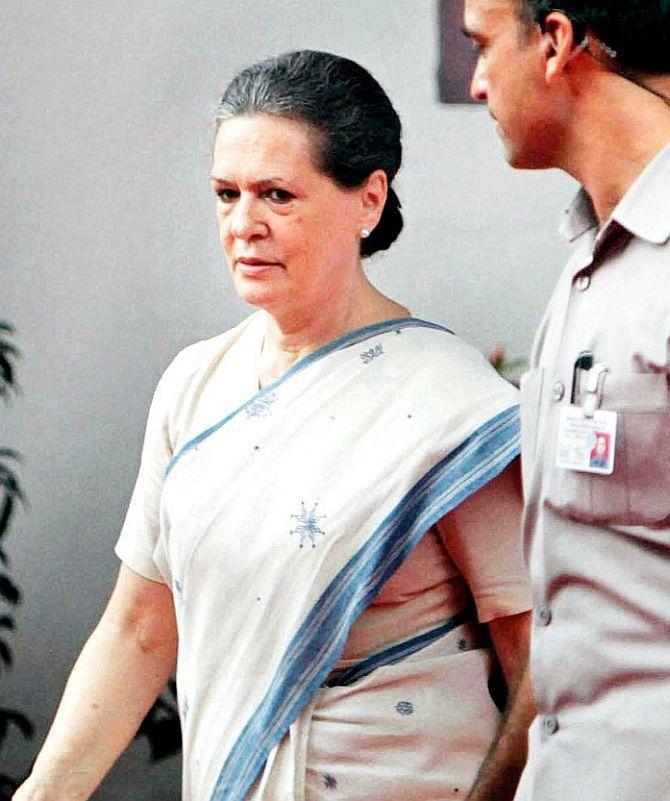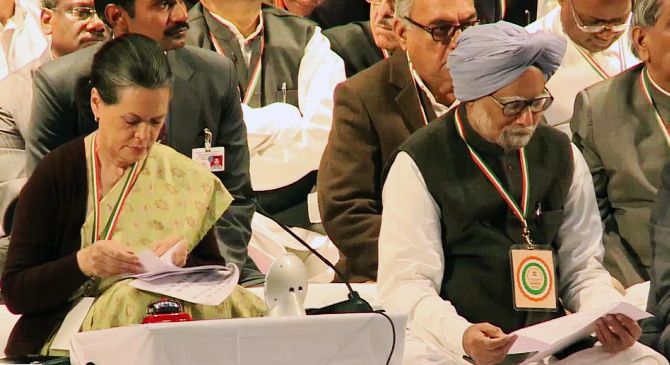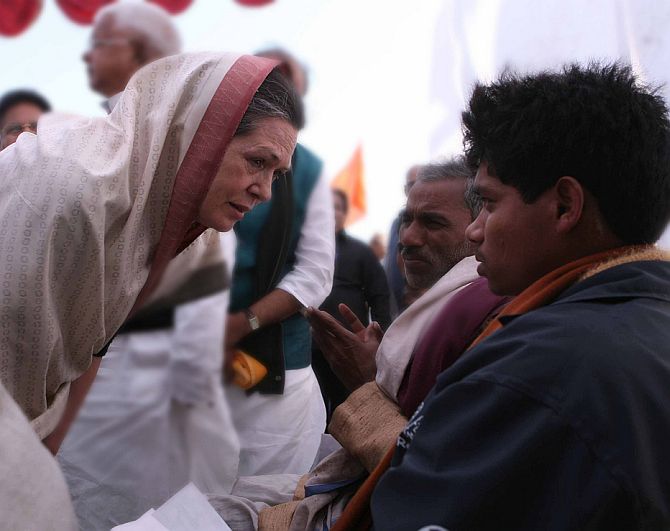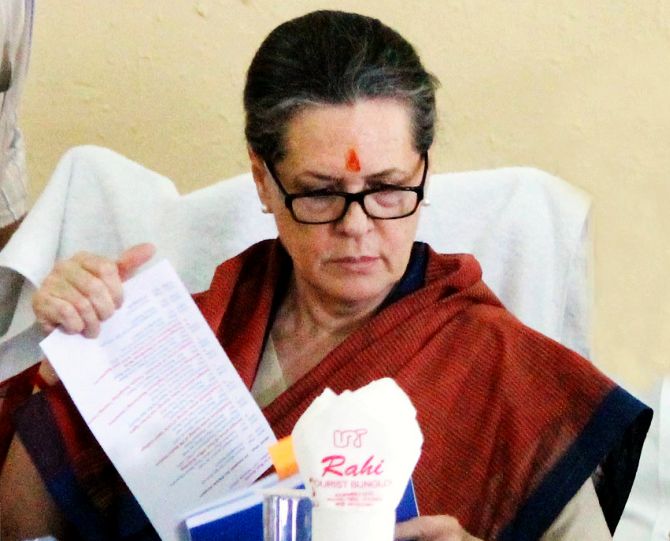
In early 2004, when the Congress had been routed in north Indian states, and even Congressmen were prophesying a two-digit tally for the party in the general elections, Sonia determinedly hit the road and stitched up alliances. Now, once again, she is displaying a similar resoluteness in circumstances that are even more trying, as evidenced by her piloting of the Food Security Bill, says Neerja Chowdhury
When Congress president Sonia Gandhi spoke on behalf of her party on the Food Security Bill in the Lok Sabha, it was a defining moment for her and for the Congress party.
What got through to people was the passion with which she spoke. And that her words came from the heart.
She was obviously tense and anxious. She mispronounced some Hindi words and her hands trembled. As it turned out, she had been suffering from fever.
It is not as if Sonia is not used to public speaking. By now she has spoken at hundreds of rallies. But Monday marked a watershed moment.
There were hundreds of MPs from her party and the opposition who were watching her smallest movement and judging every inflection in her voice.
She was speaking about a subject that has been close to her heart, one she has had to doggedly pursue, despite resistance from leaders within her own party, including Prime Minister Manmohan Singh, Finance Minister P Chidambaram, and Agriculture Minister Sharad Pawar.
...

One of the reason why the Food Security Bill took four years to fructify was due as much to the opposition within the UPA, as any other factor. But finally Sonia had her way.
In some way, the fierce debate within the UPA in the last four years reflected the vibrancy of our democracy, even as it pointed to the ideological differences between the approaches of the PM and of Sonia, and the attempts, sometimes successful and sometimes not, to navigate a middle ground.
Sonia’s speech was significant because implicit in it was a vision -- and a commitment by the Congress party, once again, to removing hunger and malnutrition.
It was not a question, as she said, of whether ‘we have the resources to do it or not’ or ‘whether we can do it or not’. It was something that had to be done.
A vision is not contingent on possibilities. It makes possible what looks impossible, and that is what leadership is all about. Otherwise we would never have aimed for -- and got – freedom; or as a poor, backward, multi-language, multi-religion, caste and creed ridden society even dreamt of opting for parliamentary democracy, which looked so non-viable at the time.
You could agree with Sonia’s approach -- that legal entitlements are the way to an “empowerment revolution” -- or you could disagree.
...

Of course, the Opposition will find fault with the Congress -- that 56 years of its economic development model had left two-thirds of India without affordable food.
Of course, the devil is going to be in the details.
Of course, implementation of the Bill will pose huge challenges, of mobilising resources, increasing agricultural production, of creating adequate storage and transportation facilities, of reforming the PDS.
Of course, it would have been better had the chief ministers been called for consultations, as suggested by Samajwadi Party supremo Mulayam Singh Yadav and earlier by Gujarat Chief Minister Narendra Modi in his letter to Dr Singh. For the states will be called upon to implement the Bill.
Through her speech, and her insistence on the passage of the Bill, Sonia was once again positioning her party in the left of the centre mode that it had traditionally occupied, standing on behalf of the deprived.
More often than not, the party has not acted on behalf of the poor in recent years. But Sonia was trying to reset the compass.
It would be naive to believe that she was not governed by electoral compulsions. In many ways, her speech kicked off the party’s election campaign.
How much of a political dividend will it yield for the Congress in 2014? That is the million-dollar question, and the answer to it remains unclear.
...

Since only the Congress-ruled states will start implementing it, and with non-Congress governments likely to take their time to identify the beneficiaries, it is not likely to be like the loan waiver scheme or MNREGA where tangible benefits came in the hands of the beneficiaries in good time before the elections during UPA I.
People have also become that much more sceptical. They will be influenced more by what they get in hand than a promise in the air.
Can food security -- and the delivery of the ‘aadhaar’ cards -- and the legal entitlements the UPA has provided in the last nine years, of which Sonia spoke, right to information, right to employment contained in MNREGA, right to education, the rights of the tribals under the Forest Rights Act -- undo the damage done to the UPA’s image and credibility?
In the last four and a half years, the UPA has become a dirty word, seen as a government of "ghotalas" and back-breaking "mehngai".
As things have turned out, food security has become a talking point already.
With repeated disruptions in Parliament, people were beginning to suspect that opposition parties did not really want the Bill to be passed and were thereby preventing the houses from functioning.
Had the Bill been passed during the first few days of the monsoon session of Parliament, it might not have created the kind of hype and expectancy that it finally did, and that turned out to be Advantage Congress.
...

Opposition leaders who spoke on the Bill in the Lok Sabha failed to make an impact because they flayed the Bill, but ended their speeches by supporting it!
On the other hand, Sonia managed to make an emotional connect with her speech. Her taking ill in the Lok Sabha just before the House took up the Bill for voting, and she could not be present there to see the passage of a measure that was her baby -- TV cameras caught her stumbling as she was rushed to the AIIMS -- added to the poignancy of the moment that might come to define Indian politics in the months to come.
In early 2004, when the Congress had been routed in north Indian states, and even Congressmen were prophesying a two-digit tally for the party in the general elections, Sonia determinedly hit the road and stitched up alliances.
Now, once again, she is displaying a similar resoluteness in circumstances that are even more trying.
The Congress may be getting its message clear, but what about the messenger?
So far the party is thinking of going into the polls under a collective leadership. But as things stand -- and last Monday underscored this reality -- Sonia may have to lead from the front again in 2014, and take on Narendra Modi.
Click on MORE to read related feature...